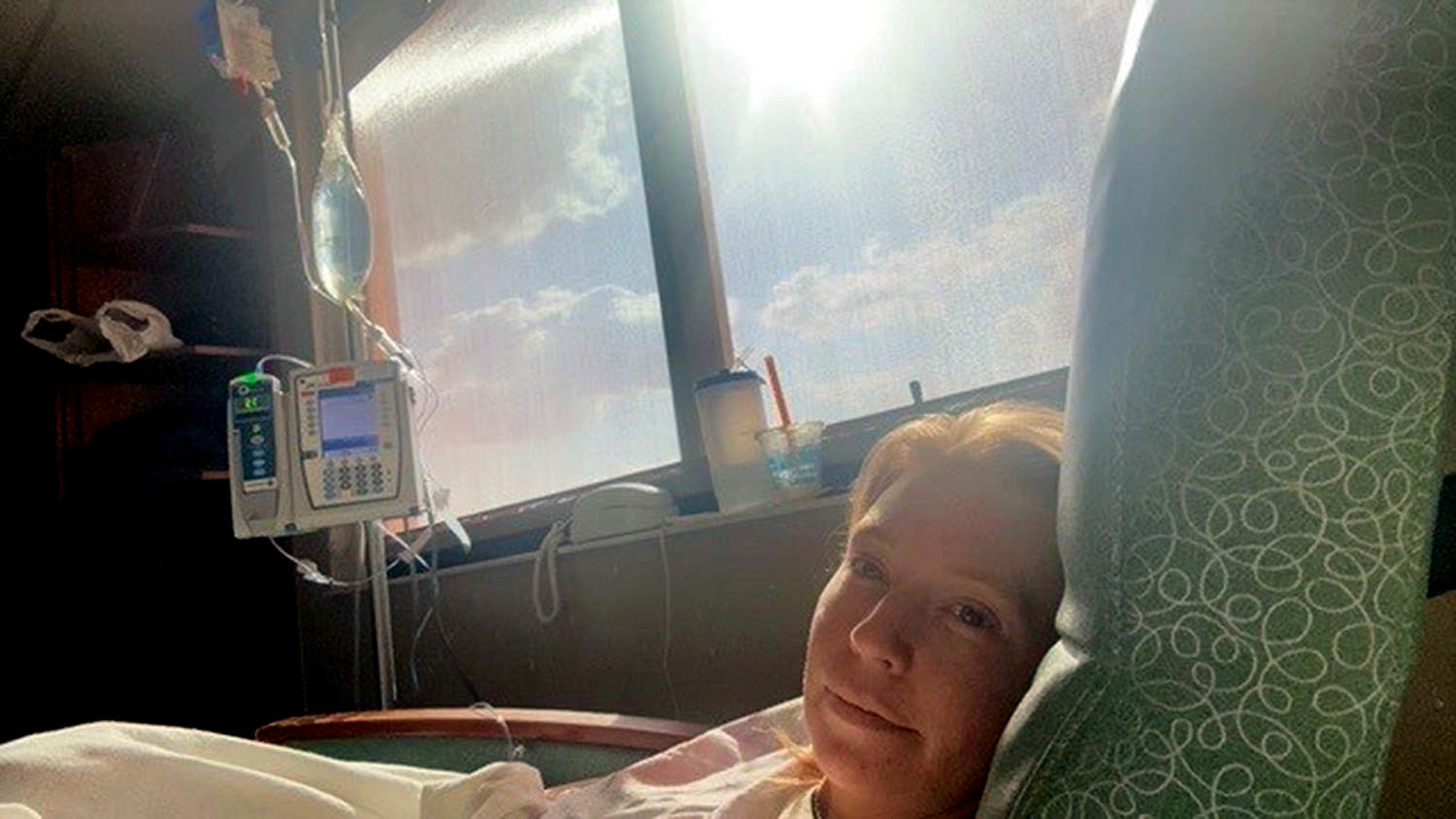At the end of 2023, Beth Riehle experienced a terrible migraine that “just seemed to never go away,” she recalls. The pain radiated into her ear and jaw. “I always felt like I wasn’t feeling good, but wasn’t necessarily sick,” Riehle, 35, of Austin, Texas, tells TODAY.
com via email. (She struggles to speak for long periods due to her treatment.) “I had general tiredness.

”Riehle visited her primary care doctor and a dentist to understand why she was experiencing such terrible pain. Finally, an ear, nose and throat doctor biopsied her tongue and figured out what caused her headaches — Stage 4 tongue cancer. “It wasn’t until I saw a specialist that I found out what I was facing,” she says.
When the headaches started, Riehle visited her medical providers. She first saw her dentist. “She noticed some discoloration on my tongue but never discussed what it might be,” she says.
“My primary care physician also examined me when I came in for my original complaints but also never alluded to any major problems.” When she met with her primary care physician, they suggested that she visit an otolaryngologist. “He thought maybe the pains were symptoms of my TMJ,” she says.
TMJ, the temporomandibular joint that connects the jaw to the skull, can cause disorders that can lead to pain in the face, head, jaw and ears, according to . But when the ENT doctor examined Riehle, they noticed something unusual on her tongue and instead performed a punch biopsy. In March 2024, the results of the biopsy returned, and Riehle learned she had Stage 4 squamous cell carcinoma in her tongue.
The diagnosis felt devastating. “It (feels) extremely lonely having a cancer most people my age don’t get,” she says. Doctors provided her with two treatment options — surgery that would remove her tongue, or radiation and chemotherapy.
She opted for the latter. Riehle started with radiation five days a week with weekly chemotherapy. Two months after finishing treatment, she experienced a new symptom.
“I started having terrible shooting pains across my forehead and neck,” she says. “I assumed they were delayed reactions to the radiation.” In September 2024, she visited an emergency room and doctors admitted her to the hospital.
She also underwent a CT scan to check that the cancer was gone. Days later, doctors shared some more upsetting news. “They told me my cancer was ‘treatment resistant,’” Riehle says.
“I had a recurrence and a second tumor.” Riehle began treatment at MD Anderson Cancer Center. Doctors recommended that she undergo the surgery to remove the tumor and most of her tongue, a procedure that’s called a glossectomy.
She felt worried about the surgery and what life after would be like. “Doctors told me I’d have a 50/50 chance of speaking again,” she says. The same day that she learned she needed surgery, her fiancé, Donald, proposed.
“He made what was the worst day of my life also one of the most memorable,” she says. Tongue cancer has long been associated with older men who smoke, chew tobacco and drink alcohol. “It is unusual for someone who’s young, less than 40 years of age without the traditional risk factors to develop a tongue cancer like this,” Dr.
Karen Choi, a head and neck surgeon at MD Anderson Cancer Center and one of Riehle’s doctors, tells TODAY.com. “Although oral cavity cancer typically affects the older male population, we are actually seeing a rise of this type of cancer in young patients.
” More people under 45, especially woman, are being diagnosed with tongue cancer, and experts are unsure why. The type of cancer Riehle has is not associated with . “These patients don’t necessarily have those risk factors that we associate with that type of cancer,” Choi says.
“We don’t really know what that is. We just know the incidence has been increasing over the last several decades.” Choi adds that knowing the signs of tongue cancer and seeking care can lead to an earlier diagnosis.
Symptoms of tongue cancer include: Many people visit a dentist first. If the dentist rules out dental problems and the symptoms persist, Choi says to follow up with your primary care doctor, who can make a referral to an ENT or oral surgeon. Treatment for tongue cancer can include radiation, chemotherapy and surgery.
The earlier the cancer is found, the better the outlook. “If you have an early stage cancer, meaning cancer that is small, has not spread to the lymph nodes in the neck, generally prognosis is good,” Choi says. “The larger the tumor is, or if the cancer has started to spread to the lymph nodes in the neck, then prognosis does go down.
” At the end of November 2024, Riehle underwent a 12-hour- glossectomy. Doctors removed 80% of her tongue and 75 lymph nodes from her neck and created a “flap” in her mouth, using some of a muscle from her leg. Prior to surgery, she had a feeding tube placed because eating was too painful from so much radiation to her head and neck.
During surgery, doctors also gave her a tracheotomy to help her breathe. “There’s so much swelling ..
. in the back of the throat. Putting a tracheotomy tube allows us to bypass that swelling so she can breathe comfortably,” Choi explains.
“Once the swelling resolves and goes down enough that it’s not blocking off the airway from the mouth and nose pathway, the trach can be removed.” Riehle remembers "doing so well after surgery. It was the first time I had been cancer-free in almost a year, so my body was really receptive to recovery," she says.
But the additional 30 radiation sessions and living without her full tongue have taken a toll. While Riehle felt pleasantly surprised the first time she spoke after surgery, she struggles to open her mouth due to tightness in her jaw muscles, a condition called trismus, common in people being treated for head and neck cancers, the notes. “I have mouth sores and mucositis, which is when you overproduce thick secretions.
It’s difficult to swallow and talk,” she adds. “I’m exhausted, if I’m being honest." Riehle also attends speech therapy to improve her ability swallow, speak and open her mouth.
Her goal one day is to be able to put a prosthetic in her mouth to make her speech clearer. “(Your tongue) is such an integral part of life — food, air communication,” she says. “I’ve had to re-learn how to do just about everything your mouth functions for.
” She feels pleased to learn that, despite the pain and uncertainty of what’s she’s been through in the past year, she’s still herself. “I’ve learned that given the circumstances, I can still manage to laugh and make others laugh,” she says. As part of her recovery, Riehle began posting “fit checks” on social media.
“I wanted to use to track my progress as far as my speech,” she says. “I also thought that by putting my experience out there, I might be able to help someone else my age or someone going through my experience in the way I wished for when I was first diagnosed.” At the end of February, Riehle finished radiation and had her trach removed.
Sometimes, she marvels at what she's been through. “I never in a million years thought I would be strong enough,” she says. “There’s a deep sense of bravery and the ability to overcome the adversity inside us.
” Riehle found a group called , which offers support to young people with tongue cancer, and she’s received encouragement after going viral on social media. Finding community helps and motivates her to share her story to be there for others. “I’ve had people who have undergone the same surgery as me find me and show appreciation for giving a voice to a group of people who aren’t necessarily represented,” she says.
“It’s been a powerful experience and an important reminder of vulnerability’s place in our lives.” Meghan Holohan is a digital health reporter for TODAY.com and covers patient-centered stories, women’s health, disability and rare diseases.
.
Health

Woman details the painful signs that led to her tongue cancer diagnosis at 35

At the end of 2023, Beth Riehle experienced a terrible migraine that “just seemed to never go away,” she recalls.















